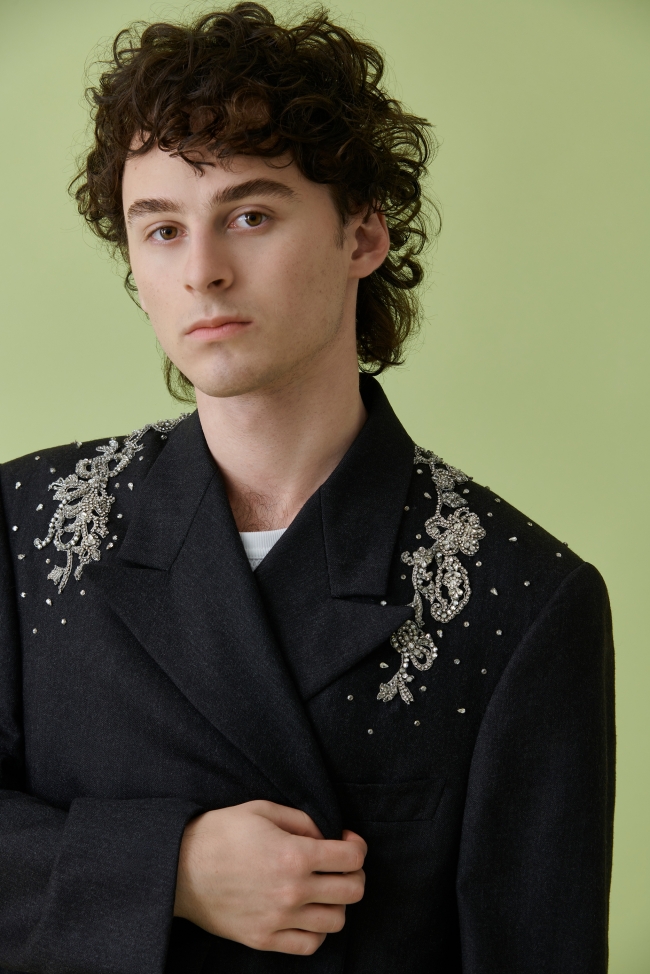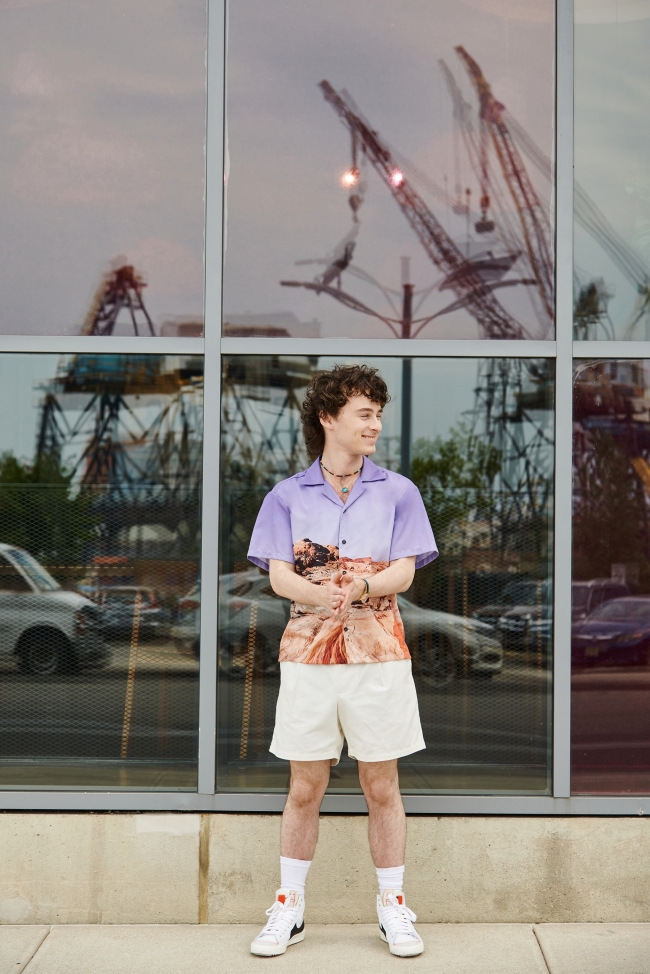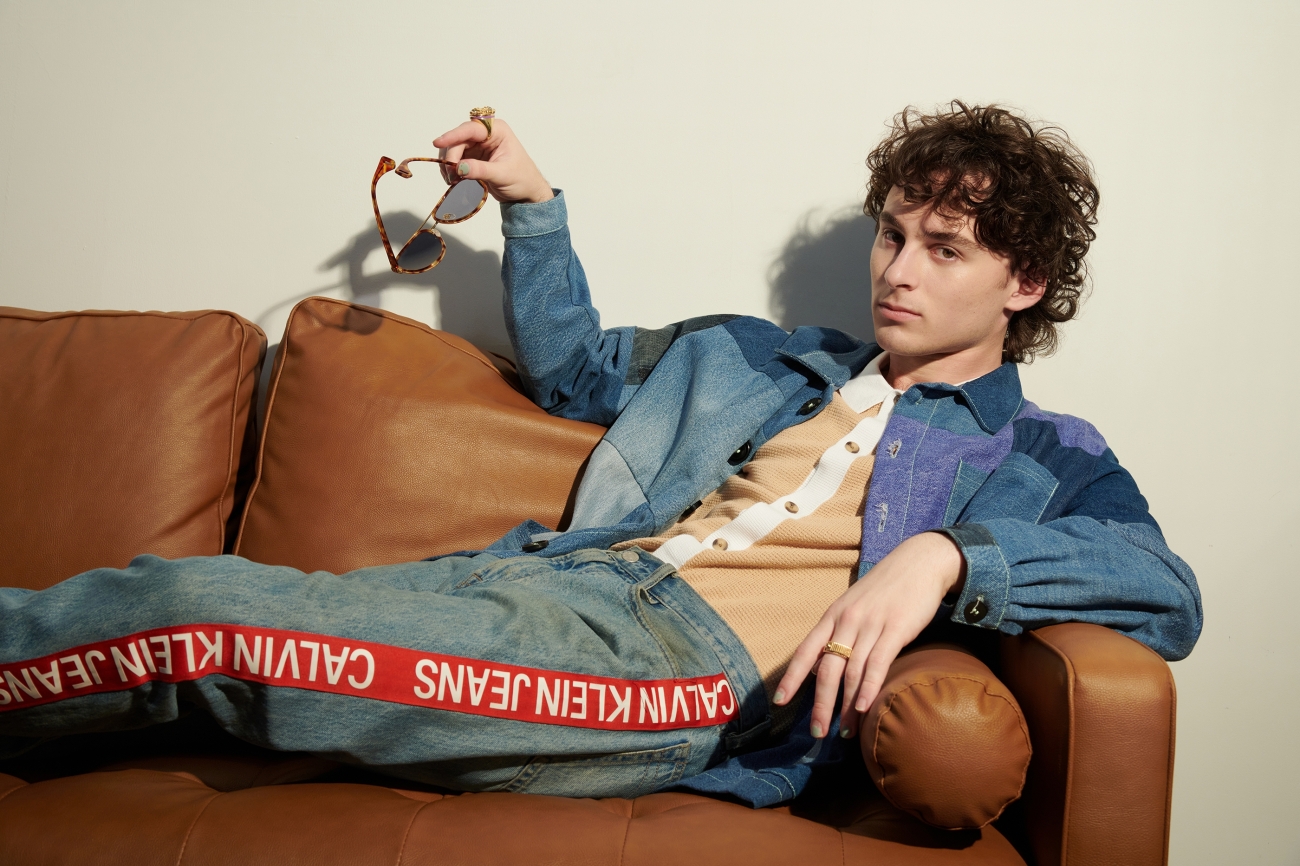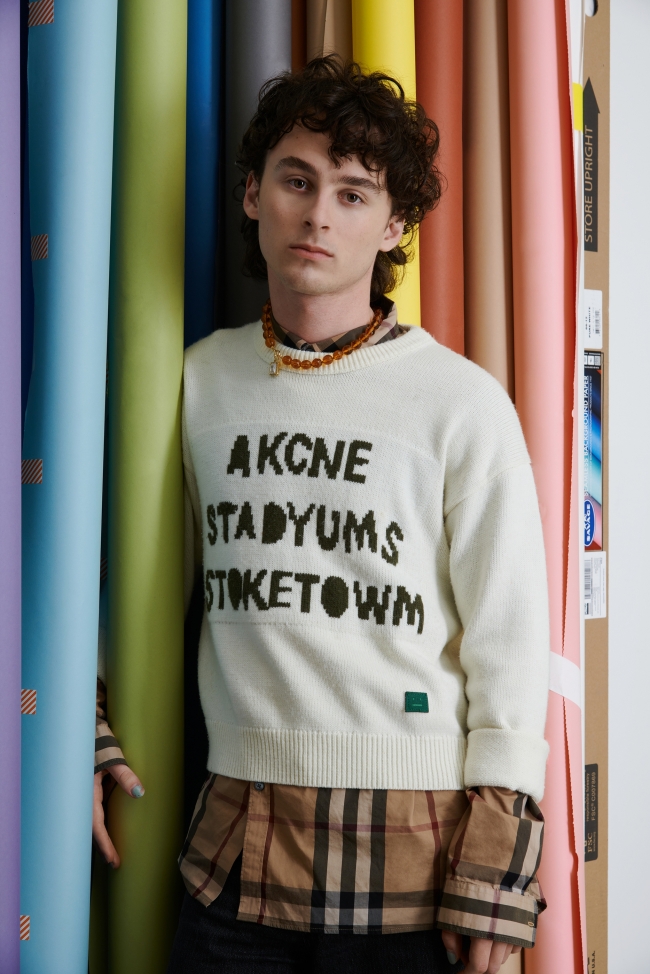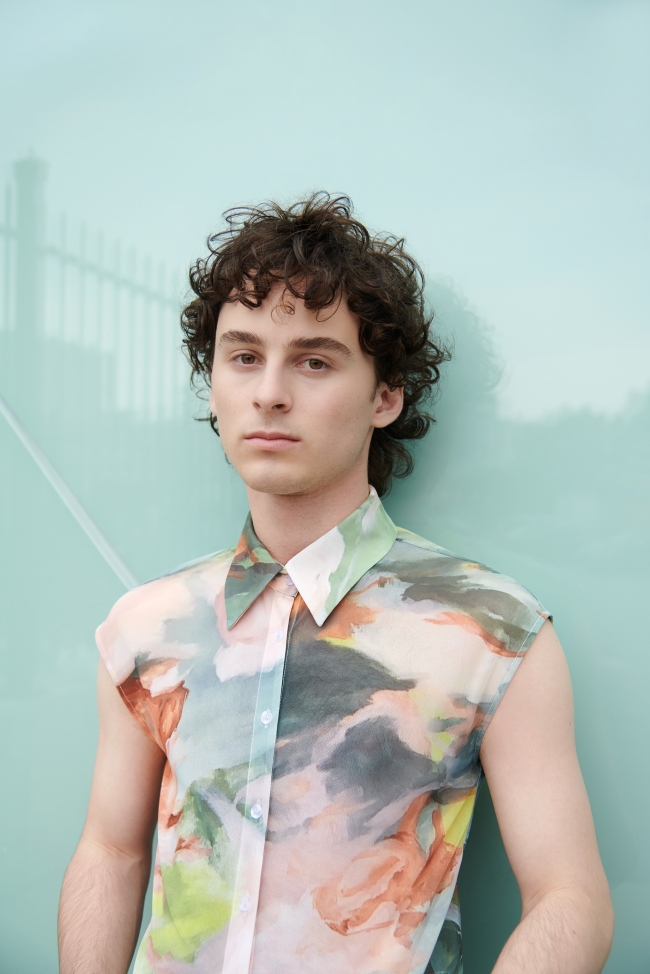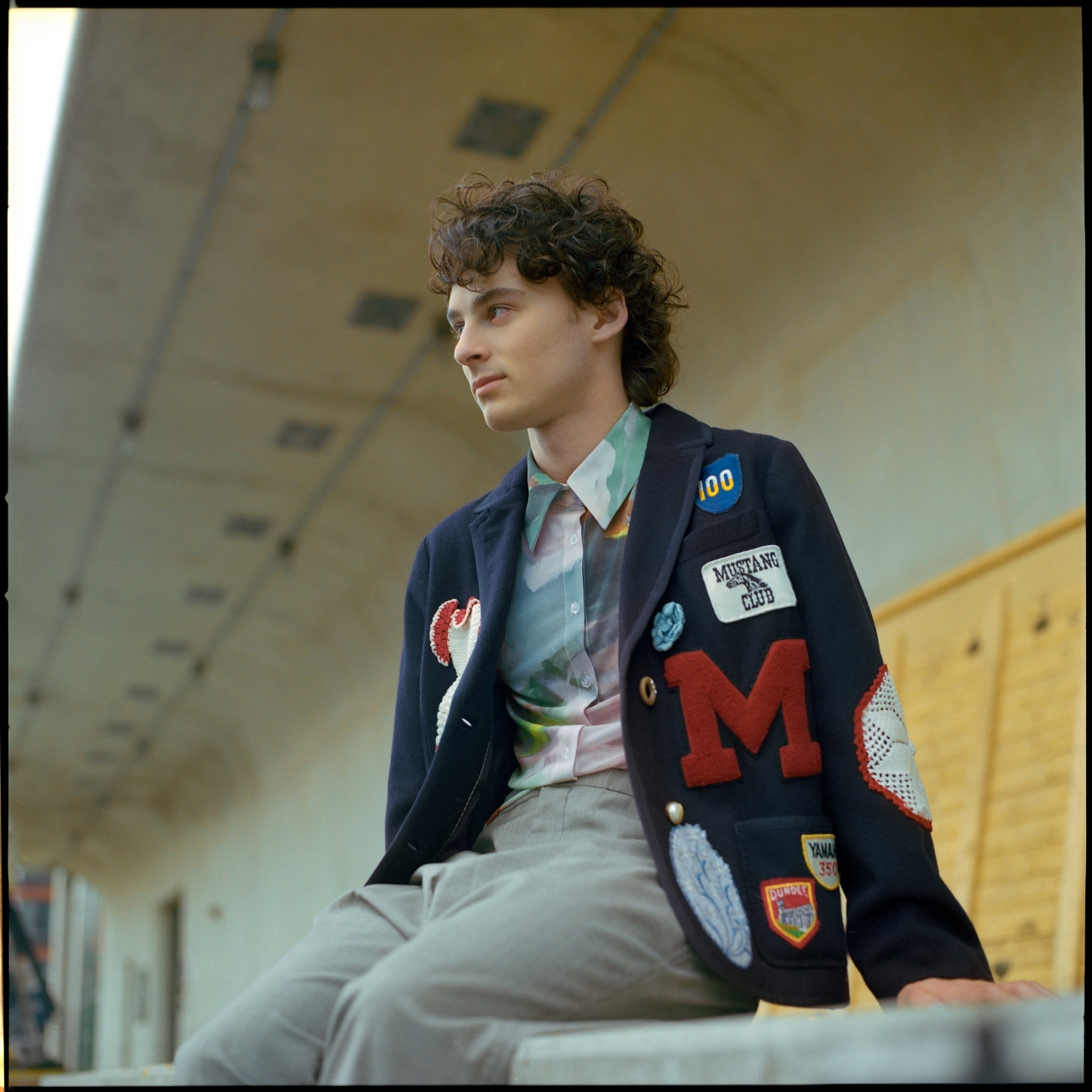Photography Jena Cumbo
Fashion Alicia Santana
Interview Tessa Swantek
Grooming Ann Benjamas
Production Trevor Person
Wyatt Oleff’s energy can be summed up quite beautifully in him telling me of meeting his ‘heroes’ in the industry, as he starts, “When I was younger, to talk to bigger actors and icons of the history of cinema…[he pauses and looks mildly repulsed by his use of the phrase, history of cinema]...icons of movies and shit - my mouth would go dry.” He continues, “As I’m getting older, I give less of a shit generally.” Wyatt’s cup is filled with passion and talent, but sometimes he seems to gulp it down, possibly for fear that the fine-lined rim is where passion borders pretension. But nothing about him feels like he could ever be pretentious - our conversation is easy, empathetic, and equal.
Wyatt is in the midst of answering the age-old question of ‘how many shits to give?’ and gets closer to the answer with each role he plays. The scale ranges from zero being Stanley Barber from I Am Not Okay With This to ten being his most recent role as Charlie in the beginning of Apple TV’s City on Fire. Charlie’s shrinking self-doubt is a demeanour Wyatt feels comfortable in, but as Charlie works tirelessly toward answering who shot his best friend (and crush) in Central Park, he begins to fill confidence’s colossal costume. In the end, it’s no longer a costume for Charlie, and it isn’t as much of one for Wyatt either. As we talk about technicality and emotion in acting and drawing, and how he’s changed since Boys By Girls last talked to him in 2019, our conversation consistently veers toward discussing self-confidence in the present while knowing there is still room for growth in the future.
Wyatt tells me that much of his story and progress in life is drawn and written in the graphite-greased pages of his sketchbook. A look into Wyatt’s sketchbook would reveal a portrait sketch next to his own writing, I can't wait to hate this face. As his eyes wander to the corner of his room to look at his drawings, he oscillates between self-criticism and self-confidence, a swing he knows well. This is, perhaps, what makes him such a great actor though, in his knowing the pendulum’s range. But with each swing, there’s a guaranteed path back to the centre. Even when he doubts himself, he always seems to immediately bounce back. And while he wavers between two extremes, there’s something quite steady about him. I don’t think his cup could ever spill over in such steady hands.
City on Fire can be streamed in full on Apple TV+
Editors’ note: SAG-AFTRA members are currently on strike. As part of the strike, union actors are not promoting their film and TV projects. Please note that this interview and photoshoot were completed prior to the strike.
We interviewed you a few years back in 2019 so I want to start by taking some things you said in that interview and seeing what’s changed since then. You said, “As I’m growing up, I’m realising how fast time passes and I try to really engage with the moment.” Do you still feel like you’re able to engage with the moment?
Interesting. I like that I said that [laughs]. I was still in school at that point which is interesting, I think that changes a lot. Growing up and just getting used to living an adult life on my own, and having acting not just be a hobby but a career makes everything different. I do feel like I try to stick to that principle, though. I try my best to enjoy things in the moment and try my best to experience things as objectively as I can. I do try to do that, I do think though everything does feel quicker as I get older. I mean, the fact that it’s July in two days is so weird! It is harder to appreciate things day-by-day but it’s the challenge of adulthood and growing up.
Even the fact that you mention it being July in two days - I was thinking about that today just the difference between the way summer felt when you’re younger versus the way it feels now. You’re really just starting in adulthood, but is there any trait you feel you had as a child that you wish you had now still?
That’s a good question. Yeah, I feel like it might be too early for me to feel that. Nothing pops out immediately. To have a lame answer, I would say, the imagination I had as a kid when I was just playing with toys. I wish I could still have that full sense of imagination and wonder. It’s important to keep that as you get older. I think being open to change is the equivalent of that wonder. If you’re lucky enough to travel and see the world and different cultures, it’s important to keep that wonder and continue learning. That’s one thing I wish I could carry through adulthood, but I think there’s different forms that it can take.
I’m sort of surprised to hear you say that, in a way, because some actors associate acting with “dress up” and that sense of wonder in a way. You’ve acted since you were very young, so does that wonder play into acting at all over time?
Nowadays, I don’t really associate that particular sense of wonder with acting. The wonder in acting comes from, for me, talking to different departments and seeing how they do things and how it all comes together. Also, the people I work with and their imaginations and creative processes are good input to have. I don’t think I feel very ‘wondrous’ when I’m acting, it’s more of an emotional state now. It is different though, absolutely.
You mention watching other people work - do you remember what you first felt surprised by when entering the industry and learning how it all works? What surprises you even now?
Oh, there’s so much! Like talking to the person who pulls focus and they let you play with whatever pulls focus, I don’t even know what it’s called! [laughs] There’s little things like that that change your perspective when you’re acting and understanding everyone else’s roles. That chemistry is very important with the crew too, not just with your co-stars. It elevates how easy the process is and how it turns out as well.
Yeah, and I think the general public only sees what’s front facing which is mostly just the actors. I think that now there has been a bit of a turn in the public seeing behind the curtain a bit more.
Absolutely. I think that change is necessary. Too often, actors think that they’re the centre of everything [laughs] but the goal would be to understand that the actor is really just part of the machine. They’re the face of the machine, but everyone’s working toward the same goal, so why prioritise one person over the other if they’re not leading the charge? For actors to think, I’m just gonna stay over here and not talk to anyone. It feels very insincere and hopefully that changes.
I really do think it is changing. Something else you said in the interview with us years ago was that you wanted to act since you were very young as you watched TV shows. Are there shows or movies that you’ve watched recently where you’ve thought, wow I’d love to be in that?
I don’t know if there’s a specific role, but I do have instances where I’ve seen actors and thought, that’s how I want to act! Specifically, it’s people who act with just their eyes - I think it’s so magical. Being able to express all that emotion with just your eyes draws me in and I want to be able to reproduce that. Bryan Cranston is an example of that. I watched Breaking Bad last year while I was filming City on Fire and watching everything he does - he’s so fine-tuned and meticulous. His eyes tell a completely different story than what he’s actually saying. That helped me to understand what I’m aiming toward at this point.
That’s so funny you say that because one major thing I noted while watching City on Fire was just how good the micro-expressions are. It’s exactly what you’re saying in that their faces are telling a totally different story. Were you conscious of that while playing Charlie?
For myself? Definitely. While I was watching Breaking Bad, I was thinking about how to implement that. I wanted to figure out how to be more subtle with the face and tell it more with the eyes. Oftentimes when I’m acting, I feel like I’m not as focused on the other individual in terms of what they’re doing. I’m more focused on my response to them. I don’t really fully see it until the show comes out. I did notice watching through the show with the fact that all the characters are hiding things, everyone has a different agenda in their eyes compared to what they’re actually presenting.
Was there a particular scene where you really noticed another character’s expression when you watched it yourself?
In the scene with me and Ally [Alexandra Doke], who plays sewer girl, when she tells me her real name. She just has this whole journey inside of her head and it was great to watch. I knew she was doing it on set but being able to just watch her was really cool.
It must be so interesting forming friendships and getting to know your co-stars and then seeing them as a character while still believing them as that character.
I think that’s one of the best parts of acting, for me. One of my favourite scenes to film is the one where my character Charlie confronts Nicky who has the bomb. I remember me and Max [Milner] were so mad at each other while filming that because that’s how we both wanted to do it. We were staring down at each other and he was doing this annoying whistling thing and I was getting really mad at him [gritting teeth jokingly] and it was this unspoken agreement to have this conflict between us while we were filming. As soon as they yelled cut, we looked at eachother and just started laughing. It was just one of those experiences that reminds me why I love acting so much. That’s what it’s about - being able to connect with someone on that level.
I love that and there was so much tension in that scene! Moving more into the show, Sam [Chase Sui Wonders] creates a zine that her dad says is the key to knowing her. Is there any specific thing in your life that you might feel is somewhat key to knowing you?
Hmm. That’s a great question. I have a journal, but that’s a lame answer so I’m not saying that. I think it's probably my sketchbook. I think every sketchbook tells a journey and a story in its own right, but I think that progress over time shows my development, not only through art and technicality. My story is told through there as well.
I like that answer, mine is too. I do a lot of portrait art. What kinds of things do you draw?
I am trying to get technically better - meaning anatomy, structure, three - dimensions, perspective. Half of my drawings are - and I hate doing this - but they’re art studies. So I reference things and try to understand the shape and contour lines. I hate referencing stuff because it’s not nearly as good as what comes from my head. I love drawing stuff from my head whether it’s characters or heads, or facial expressions. I try to convey that sense of depth without using shadow. I’m trying to get to a point where I can sit down and sketch and I can just understand that stuff on a technical level. I’m nowhere close to where I would like to be, but that’s part of the journey!
I think in any creative field, it’s hard to sometimes look back on previous work of yours because improvement shows so quickly the more you practise. I always get nervous about something I’m doing now being something I hate in a few years. Do you ever find yourself in that mindset?
All the time. I’ve only been drawing for a year and a half so my window of time to look back on stuff isn’t as long. But definitely going back on stuff I’m like, wow, I could do much better now [laughs]. I remember I was drawing this head, and I wrote next to it - I write a lot of notes next to my drawings - “I can’t wait to hate this face.” Like, I can’t wait to see this as awful and be better. But I want to ask you, when you do portraits, do you structure them and then do the detail or just freehand?
Well, you were talking about preferring to draw from your mind before, but I actually am somewhat mind blind in that I don’t really visually see anything. So, I always need a reference. I use a reference portrait and draw the outline and then just go in with colour pastel. I always start with the eyes, because I think once you have the eyes, then you have the person even if not everything else is perfect.
Ah the eyes are my least favourite part! I don’t like the way I draw eyes right now. It’s tough.
Why do you not like the way you draw them now?
They feel a little dead sometimes. Sometimes I want to draw them more three dimensional to give them depth, but then the pupil looks weird. The window to the soul is very hard to draw. I don’t even know what kind of eyes I want to draw. I don’t know if I want them to be stylized, I don’t know.
That’s one of the best things though - when you get the eyes right, and you feel like you’re looking at a person in your drawing, that’s one of the best parts. Do you have any of your drawings with you?
Yeah, whenever I’m looking over here to the corner, I’m looking at my sketchbook which has two pages that aren’t good [laughs]. When you were talking about the eyes, there’s one that came to my mind. It was a face I drew from my imagination that looked like a real face that I was proud of, but that’s the only one, in recent memory, of eyes I really liked. Well, not true. I have very low self-esteem about my art right now. My end goal is black and white comic-style art.
I love that style. I’m sure the more you do, the more confident you’ll feel. I could talk about art for way longer, but I’ll get us back to the show. Here’s a fun one - if you had to trust someone to solve a mystery about you, who would you trust and why?
[laughs] I like that question a lot too! I’m trying to think of my friends who will predict things I do or like. I’m thinking probably my friend Jaeden [Martell] who I did the It movie with. I feel like he has a fundamental understanding of me. He would say, ‘he went to [this], because he likes [this].’ Also, he’d get really into it! He’d be like, this is going to be a great story one day!
[laughs] That’s so nice to have a friend like that! Also, you filmed in New York, right? There’s an element to the show of each person’s “stomping grounds” in a way - and Charlie is the character that is trying to find his. As Wyatt, what kinds of places do you consider your “stomping grounds?” You obviously don’t have to share actual places, but types of places.
Yeah! I get what you’re saying about not wanting to say places though. I would say there’s a certain park that I like a lot that is featured in the show. I want to give you a specific answer, but I also don’t! I don’t know if there’s a place I’d consider my ‘stomping grounds’, like ‘I’m the king of this place!’ [laughs] I very much go with the flow. I live here but I don’t claim any spot. I like to be a part of a spot. I also always like to discover new places in New York as well. I don’t really go to the Financial District that much, but it’d be nice to check it out, and go up beyond 14th street! I’ve never heard of that before [laughs]. Experiencing new parts of New York is always fun.
While you’re filming, do you tend to view the city a bit differently?
Yeah I’m living here and shooting this show, and so when we were shutting down the street, that gives a very different perspective. It gave me these spots I've never been to. Then walking by those areas later, and being like, oh I remember when we filmed there, it gave me specific memories around the city that are very unique to this profession and industry.
Did you have a favourite spot you filmed in?
I felt very stressed out at any of the spots that were public because I felt like we were being a nuisance and like we were getting in the way. So I was always very anxious and nervous that people would get mad. It’s also embarrassing to act in public sometimes. Favourite place - I’d say anything that was near good food because then sometimes during lunch we’d go get that food. In Nolita, there was Katz’s Delicatessen nearby. So having a good pastrami during lunch was very refreshing!
Oo that does sound good! On the embarrassing note, was there a particular public scene that you found hardest?
I mean, there’d be stuff that would interfere, especially because of the time period. Anywhere there were newer cars or outdoor seating (which came about from Covid) we couldn’t film there. If you notice, every restaurant has outdoor seating so it was difficult to film in those spots! There would just be times when people or someone or something got in the way and we had to work around it, but I think that’s the magic of filming in the city.
Obviously I wasn’t doing the set design so I didn’t have to worry about it, but I think it’s so hard to do it in New York City. I remember when we were filming, they were also filming The Marvellous Mrs. Maisel in Rockefeller’s skate rink. Watching all of these people in their 1940s attire was really cool to see how they transformed that spot. It was late at night too - like 11pm or 12am.
Oh wow, that must have been amazing to watch. Your character, Charlie, at least in the beginning, is struggling with a lot of self-doubt which affected the way he spoke and moved. Can you tell me a bit about that?
I don’t think I ever thought about the way Charlie moved - I think that just came with everything else. When you’re acting, you put a part of yourself into that character and you take a part of them with you like a trade. That self-doubt comes from a very real place so I think that was very easy for me to show. There was this baseline for the character I would always go back to. I could then ‘go into his mind’ and experience things through his eyes.
You mention experiencing self-doubt yourself, and I feel like so many actors say that they view playing a role as sort of a protective cover where they can be really confident being someone else, but as themselves they feel insecure. Have you ever viewed acting this way?
Definitely. There’s been many times where I feel I’m more confident in myself and my presentation through a character. Charlie, through the end of the show, doesn’t give a shit and that was fun to play. He understands his role and who he is. It was a great thing to play because I felt like it rubbed off on me a little bit. I was able to have some of that confidence in my normal life as well. When you don’t have to worry about your own problems, and you worry about your character’s problems, it’s a very different experience. It’s a lot more liberating than it sounds to take on someone else’s problems. When it’s not you, you have more confidence in those negative traits that you might want to shun normally.
Especially with a character like Stanley Barber [in I Am Not Okay With This], he’s a lot more confident and goofy. Being able to sync into that character was so fun because I could be loose and let it be. Being able to retreat into that character and grab a piece from them is nice.
I wonder how that would work then if you had a character so unlike yourself.
Just from my experience, a lot of roles have been similar to me in some kind of way. Maybe as I grow older and do roles that are more intense…There have been self-tapes I’ve done of characters who are just nasty and those are a lot of fun to play too. I think it’s interesting because a lot of the nicest actors play the meanest villains. I don’t know what that phenomenon is yet. I think this theory that I have of always needing to play a character that’s somewhat like you will maybe come crumbling down at some point in my career. I never want to play the same role twice, so at some point I will be playing someone who isn’t like me at all.
I’m sure you’ll get there. Okay, I have a fun question, but it might be a hard one to answer! Sam says of Charlie, “What this boy lacks in experience he makes up for in enthusiasm.” If you were to fill in the blanks for yourself, ‘What this boy lacks in __ he makes up for in __’ what would you say?
Great question [laughs]. I think an argument could be made for the original line to apply to me. I’m still young and gaining experience. I’m very enthusiastic when it comes to trying new things. Hmm…I want to say something like “what he lacks in confidence, he makes up for in…motivation towards others?” No, that’s not right, hold on. This is a hard one. I guess, “what he lacks in self-esteem, he makes up for in empathy.”
It’s interesting to me that you mention self-doubt a lot, because I do think you come off as a self-confident and self-aware person at least in the other interviews I’ve seen of you.
Yeah maybe it’s not necessarily self-esteem. I do have a good understanding of myself, but I’m too hard on myself a lot of the time. I need to lighten up about it, for sure. For all of those interviews, that’s the name of the game. It’s what I’ve been trained to do - just answer and be confident. I try to be confident in myself but there’s good days and bad days. It’s very hit or miss with my own confidence all the time.
I have another quote from the show - Sam says, “The key to meeting your heroes is pretending you don’t give a shit about them.” Have you met your heroes?
There’s been a few instances. As I’m getting older, I give less of a shit generally. I can admire someone and be like, they’re a person though, so whatever. When I was younger, to talk to bigger actors and icons of the history of cinema [pauses and rephrases] - icons of movies and shit - my mouth would go dry and I would get really nervous. It would be very obvious. I can’t remember anyone specifically, but I definitely gave too much of a shit - I thought, this is everything, this is wow [mocking himself]. Now I just calm down and realise this person has done things I admire and I’d like to be like them one day. I agree though that the key to meeting your heroes is to not give a shit about them. Or to just treat them like a person. That is very hard to do when you admire them and see their stuff on the TV and feel like you know them but you don’t really at all. It’s very weird how we treat people like that.
I think especially with social media, you do sort of feel like you know these people, and a lot of people are saying that because of that, there’s really no such thing as an “icon” or a “movie star” anymore. People feel so accessible, I guess.
Yeah, that’s definitely part of the reason I don’t like using social media that much. It feels like a one-way mirror. Like people are watching you. Especially when it comes to my friends or people I know, if I post them, it feels like their privacy is exposed and that’s my fault. It’s like parasocial relationships - that’s very strange and I don’t like putting myself out there as much as I did when I was younger. I value my privacy and I feel like it’s not necessary. I want my life to be my life and no one else’s so why share it with everyone all the time? I like doing a little journal thing of showing what I’ve been doing, but never telling more beyond a few pictures. I don’t like having people feel like they know me when they don’t.
Right. And I’ve seen actors say that they think social media could affect casting too even in terms of following. Or maybe they could be somewhat typecast based on what they portray on social media.
I think some directors value someone’s personality and how that affects the role - sometimes it’s just about whether someone would be nice to work with so that would be a great way to use social media. I think the idea of social media stars and influencers - wanting to get someone with more followers - has gone down. It’s not just about follower count. That’s not gonna get people in seats. I think people and their personality though can definitely affect how they’re cast.
I did an independent called Stay Awake and the director watched a bunch of interviews I did and he told me that he could tell that I’m very thoughtful. I thought it was interesting how before he even met me he was doing research and analysing me. That goes back to that feeling of people thinking they know you before they actually know you. I think a good social media is a representation of you without being too involved in your personal life.
I agree with you. It’s interesting too because so many people have such a different opinion on social media too.
I mean, to each their own. But I do value that privacy.
Before I let you go, what are you most looking forward to at the moment - in your life or career?
I have fun summer plans. I’m travelling abroad. I’m going to Europe. I’m going with some friends. I’m excited for August when everyone comes back in town and it sort of gets back to the status quo. I’m excited for any kind of new project coming out. I think there’s a lot of things to be excited about, always. Okay, not to get into a philosophical answer, but I think in life it’s always important to have something to look forward to - a certain date that you work toward. Having that to get through day-by-day is important.
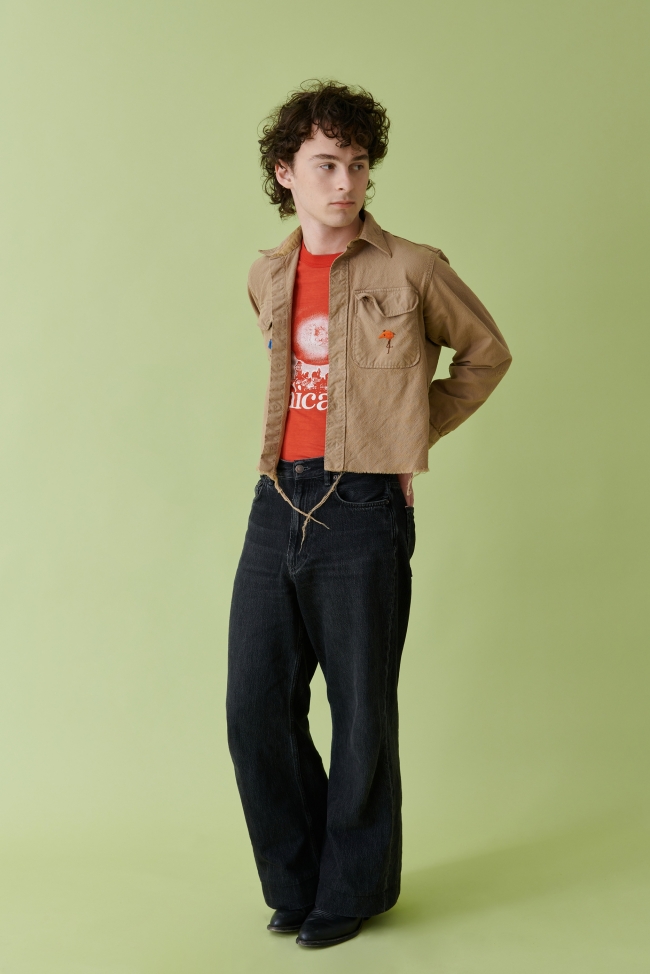
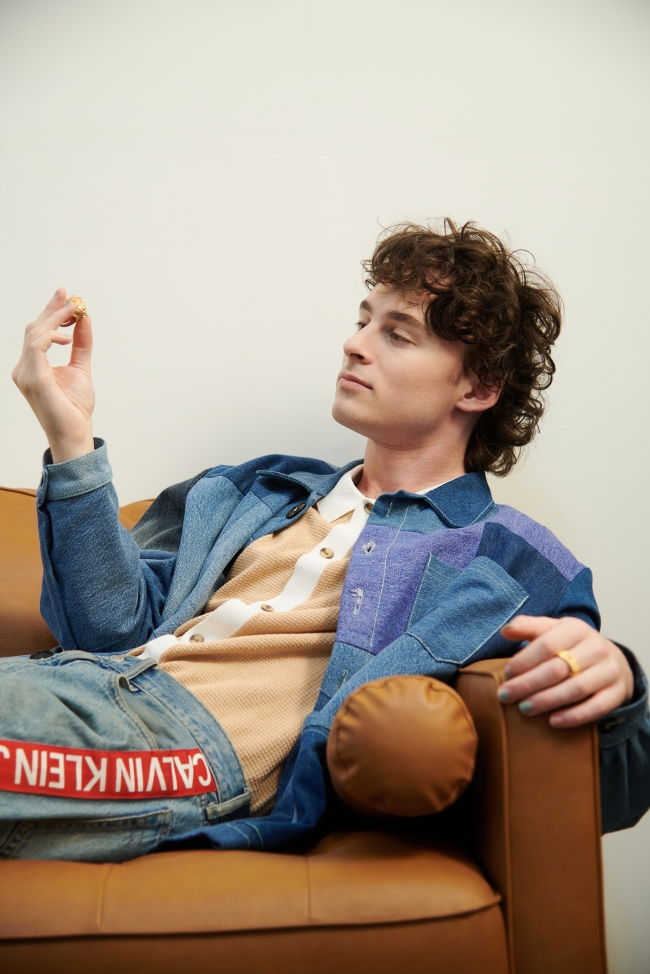
above left: Wyatt wears vintage T-shirt and Shirt, Trousers by Acne Studios and Boots by Tony Lama
above right: Wyatt wears Jacket by The Series, Shirt by Onia, Jeans by Calvin Klein and Rings by Acchitto
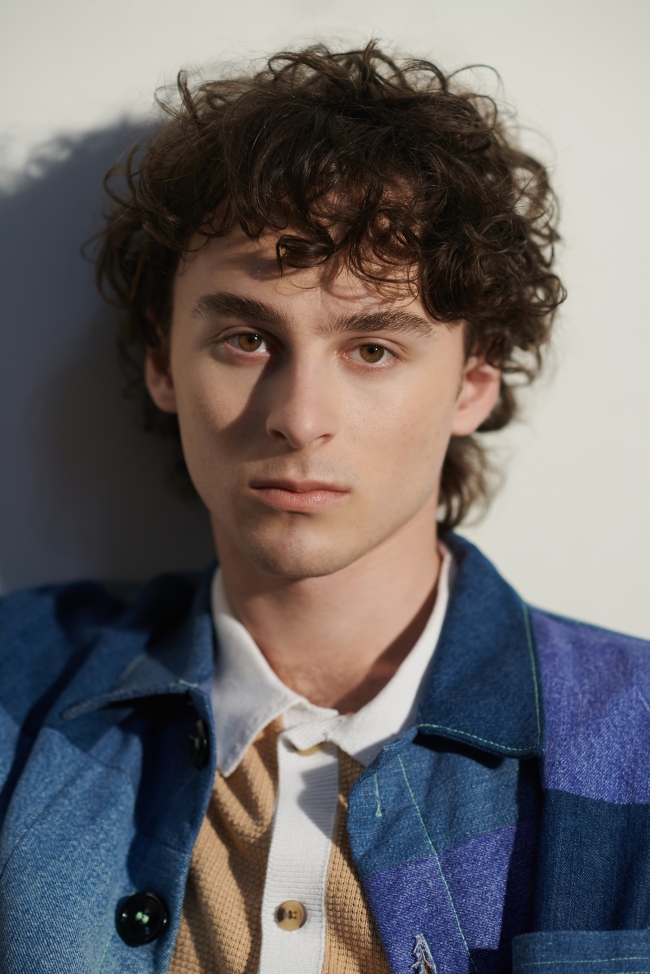
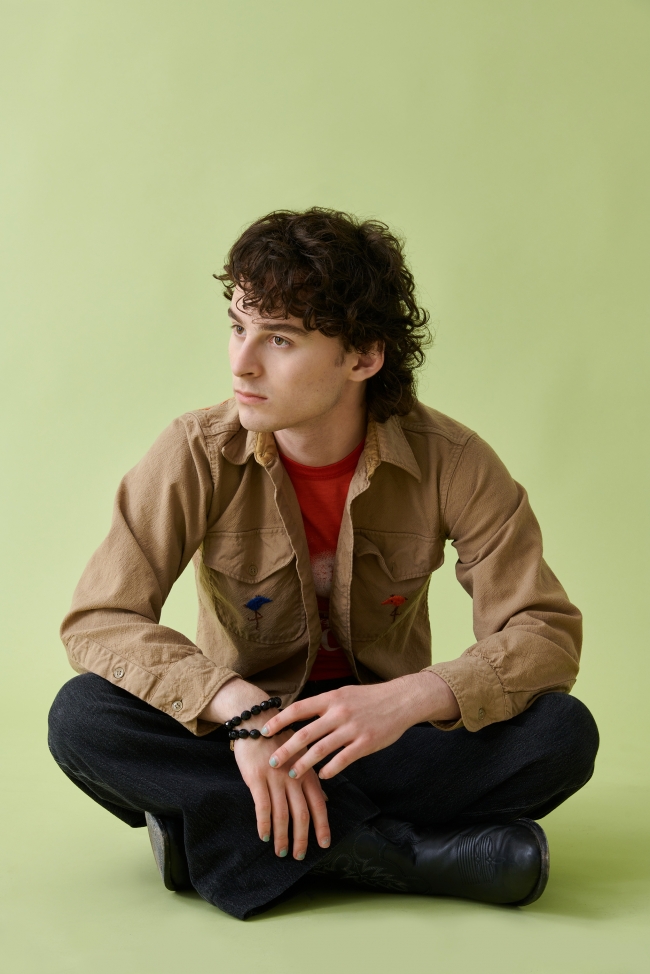
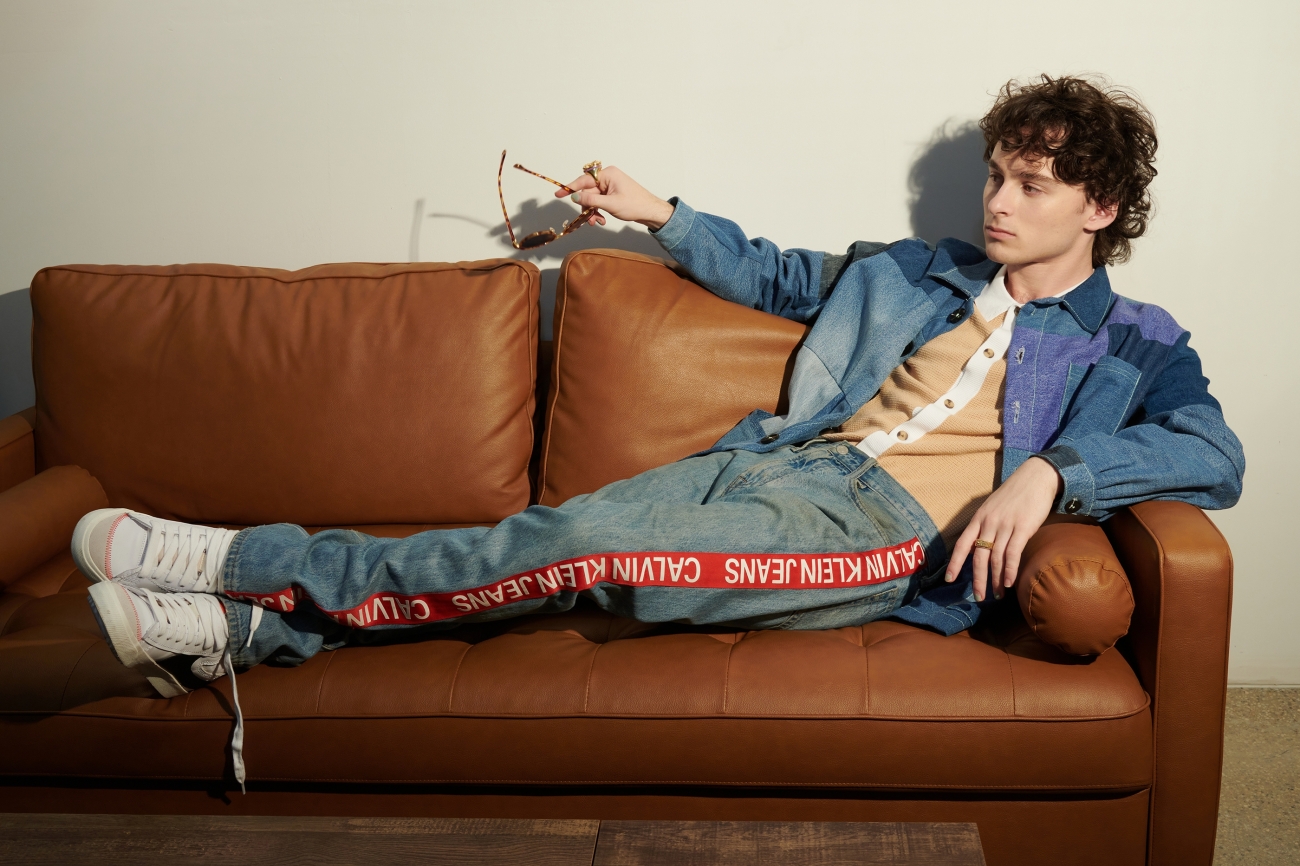
above: Wyatt wears Jacket by The Series, Shirt by Onia, Jeans by Calvin Klein, Trainers by Nike, Sunglasses by Gucci and Rings by Acchitto
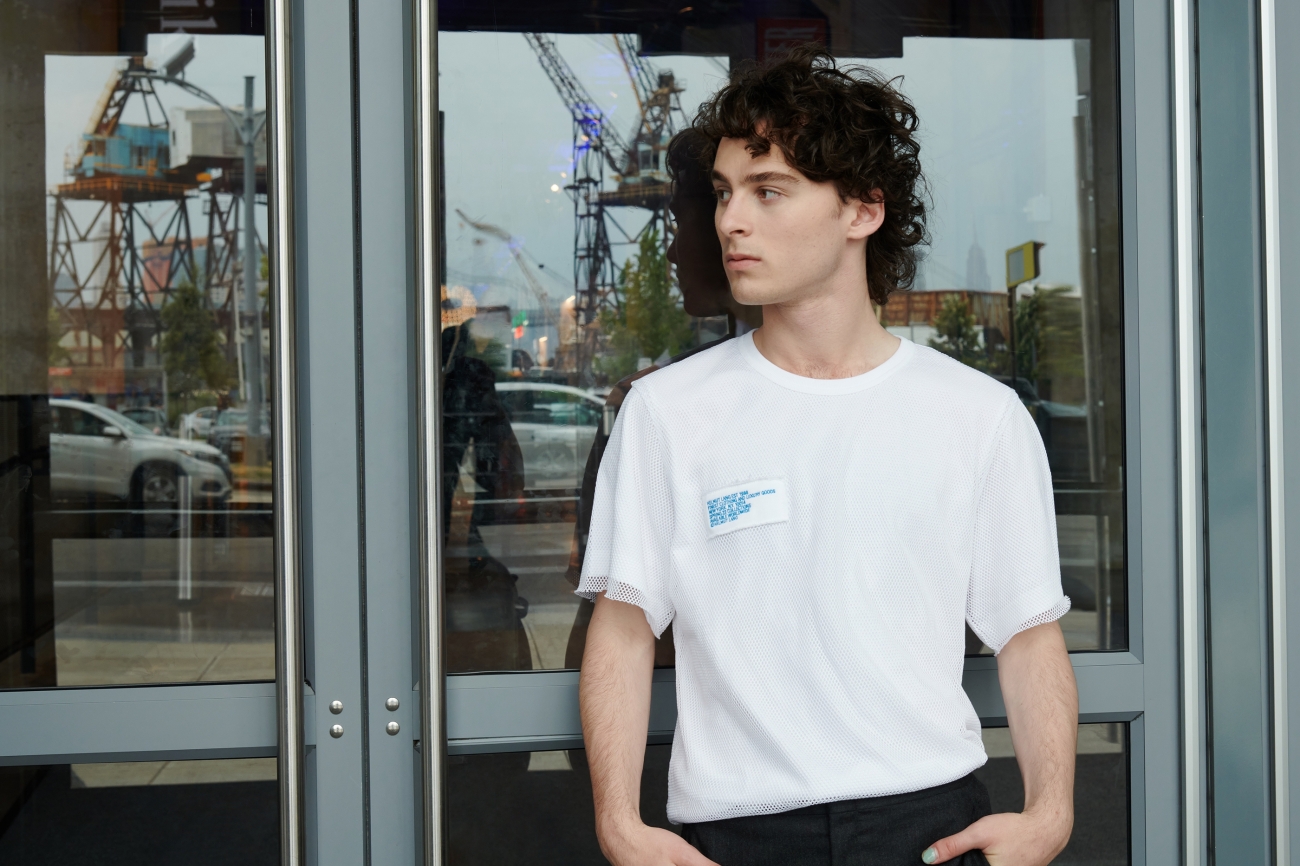
above: Wyatt wears T-Shirt by Helmut Lang and Trousers by Namara NYC
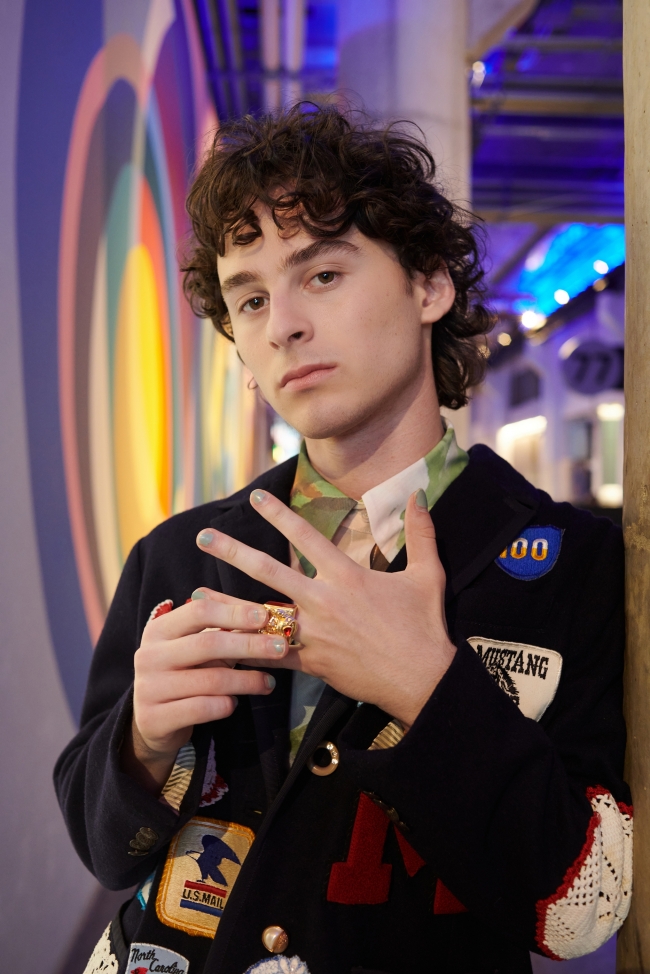
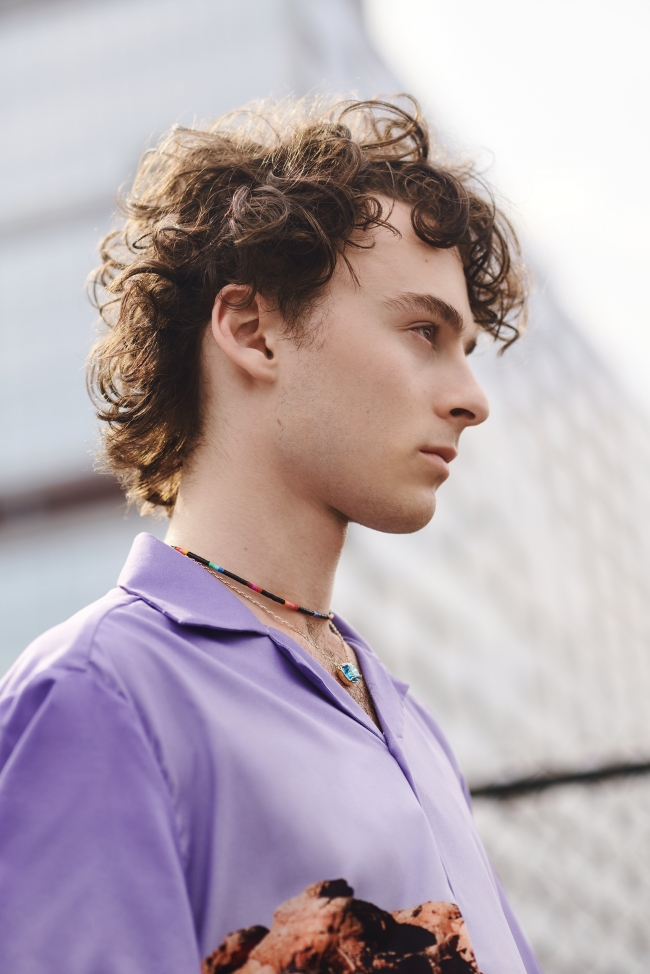
above left: Wyatt wears Blazer by The Series, Shirt by Caroline Zimbalist and Rings by Acchitto
above right: Wyatt wears Shirt by CAT and Necklaces by Elsie Frieda
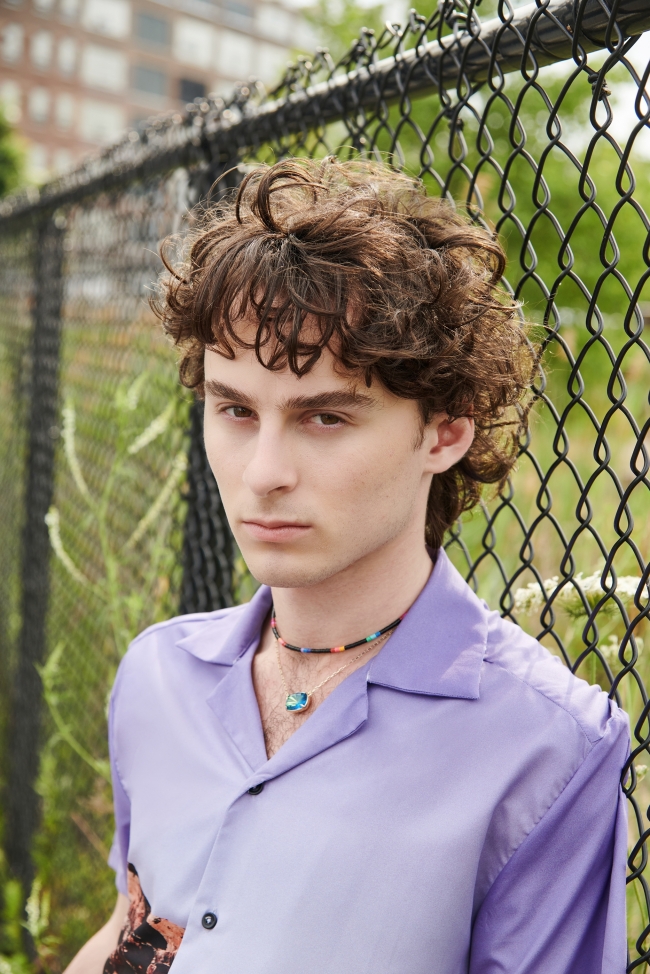
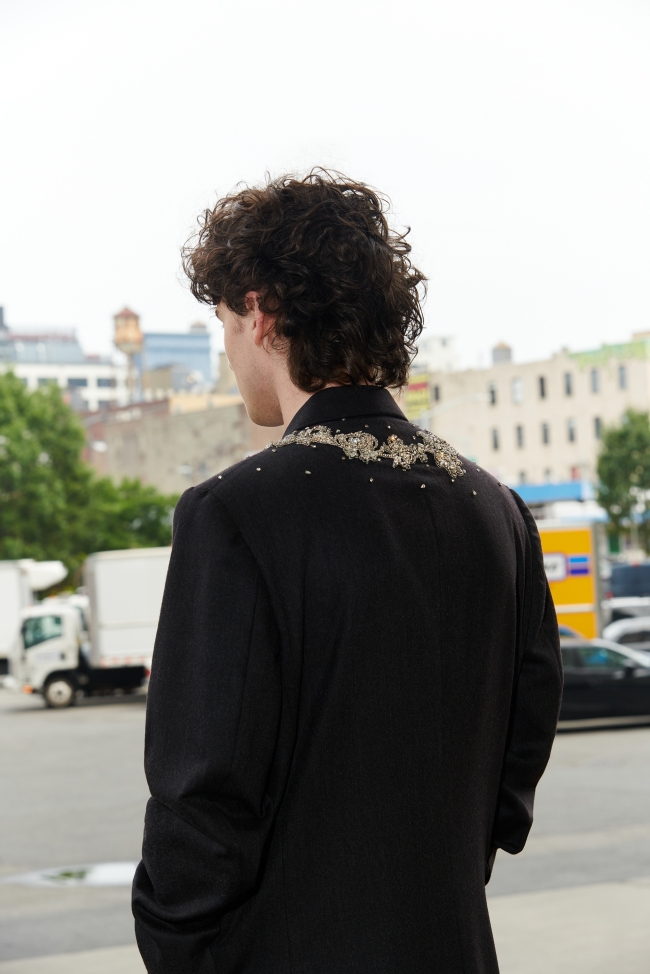
above left: outfit as before
above right: Wyatt wears Jacket by Namara NYC
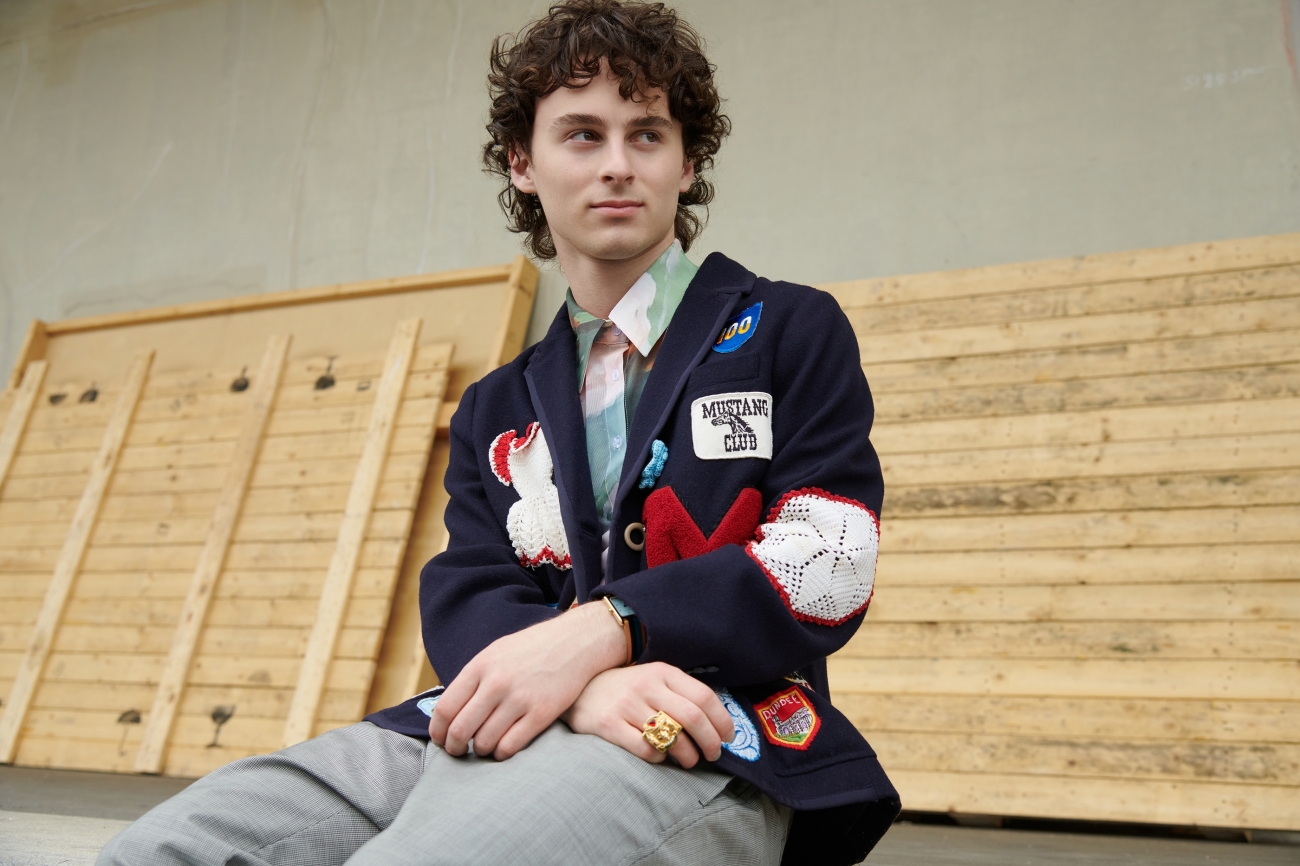
above: Wyatt wears Blazer by The Series, Shirt by Caroline Zimbalist, Trousers by Stella McCartney, Watch by La Californienne and Rings by Acchitto
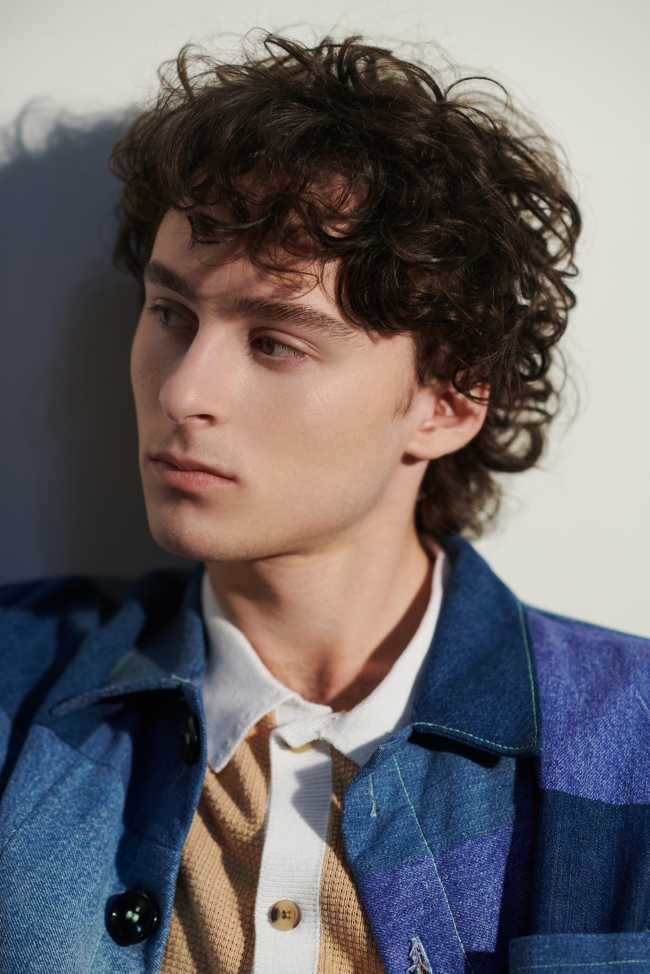
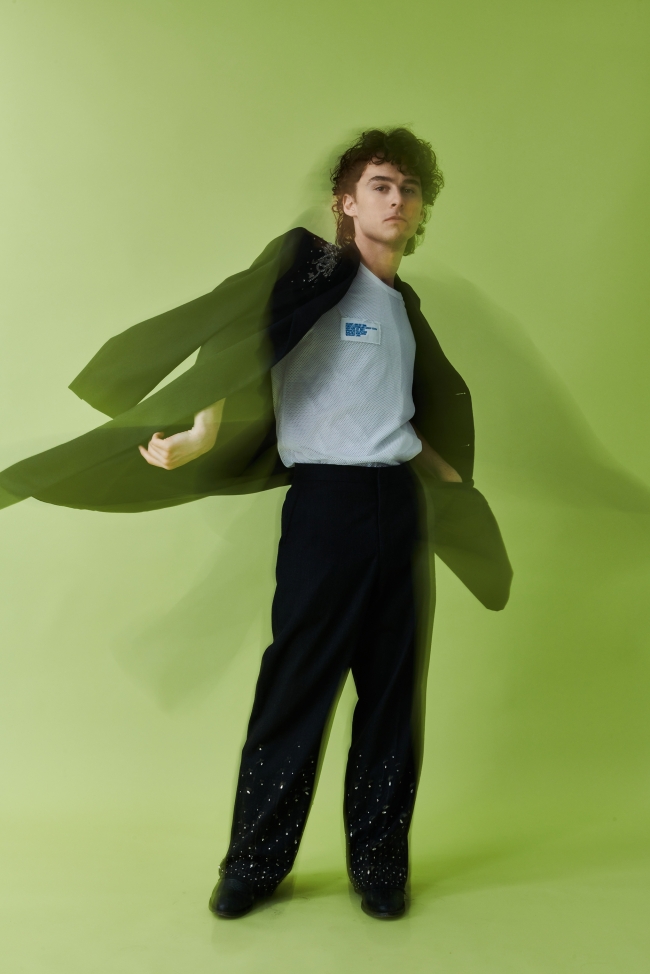
above left: outfit as before
above right: Wyatt wears Jacket and Trousers by Namara NYC, T-Shirt by Helmut Lang and Boots by Tony Lama
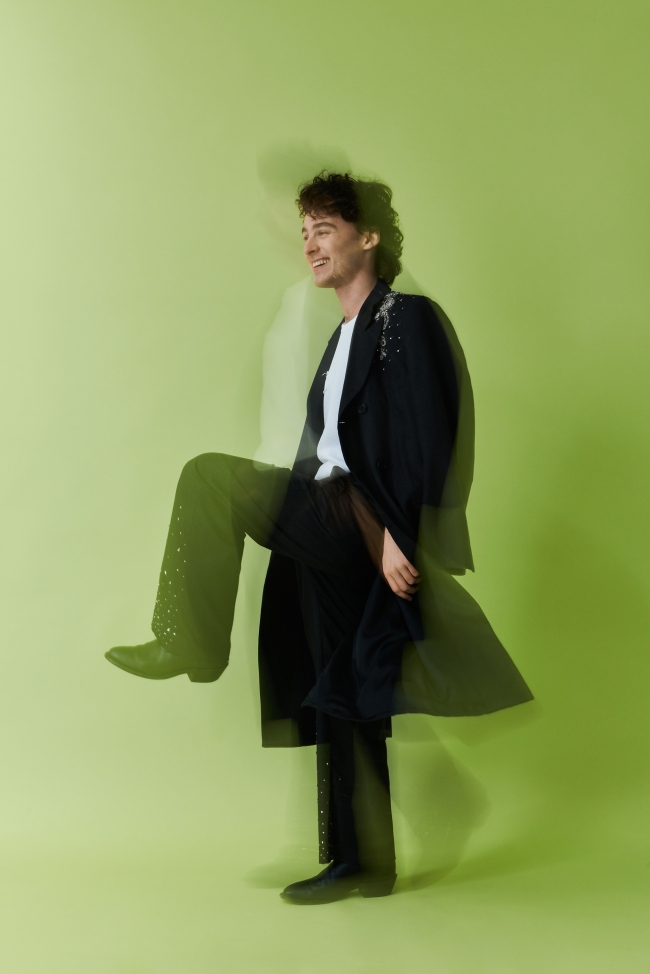
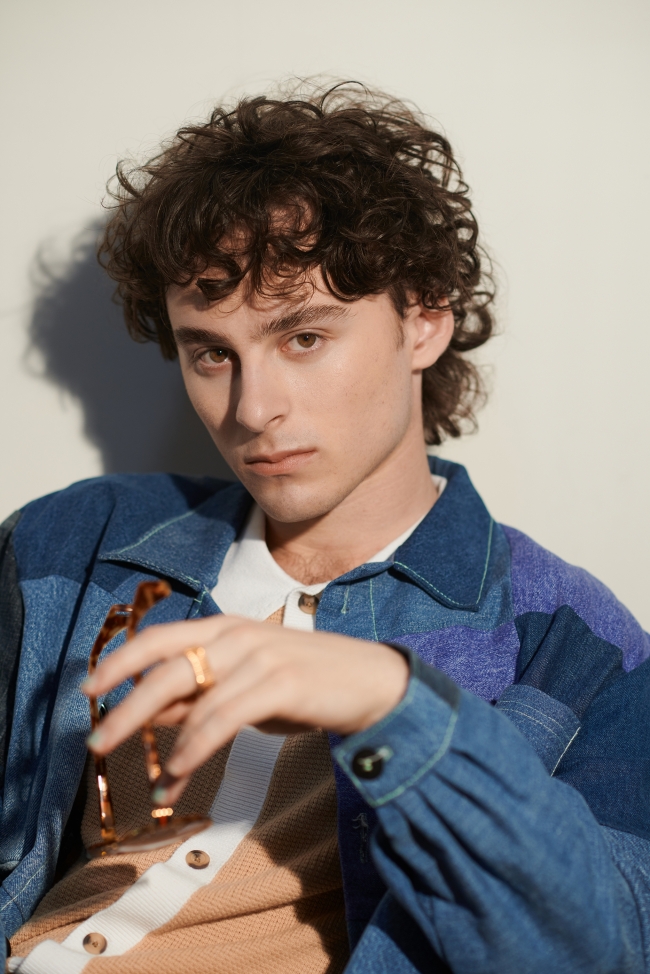
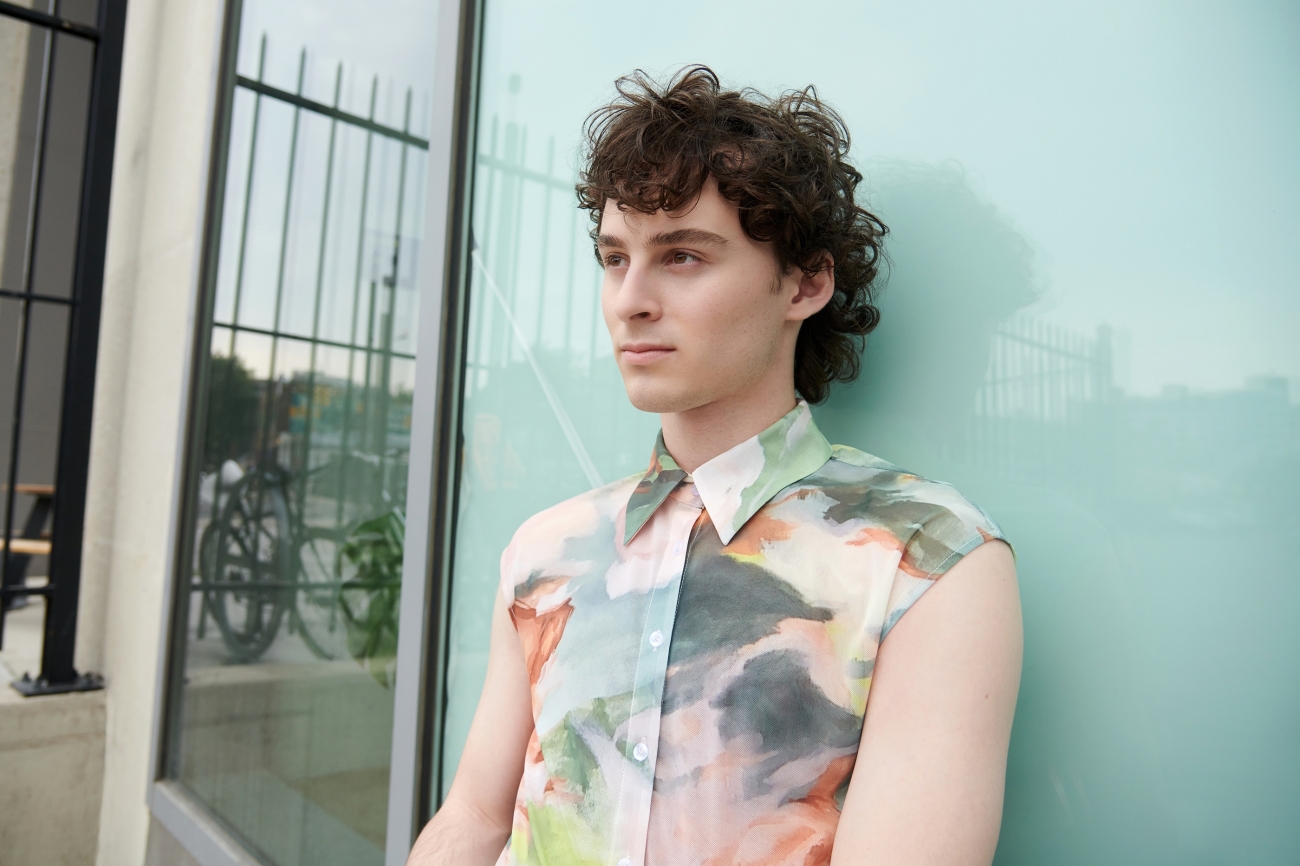
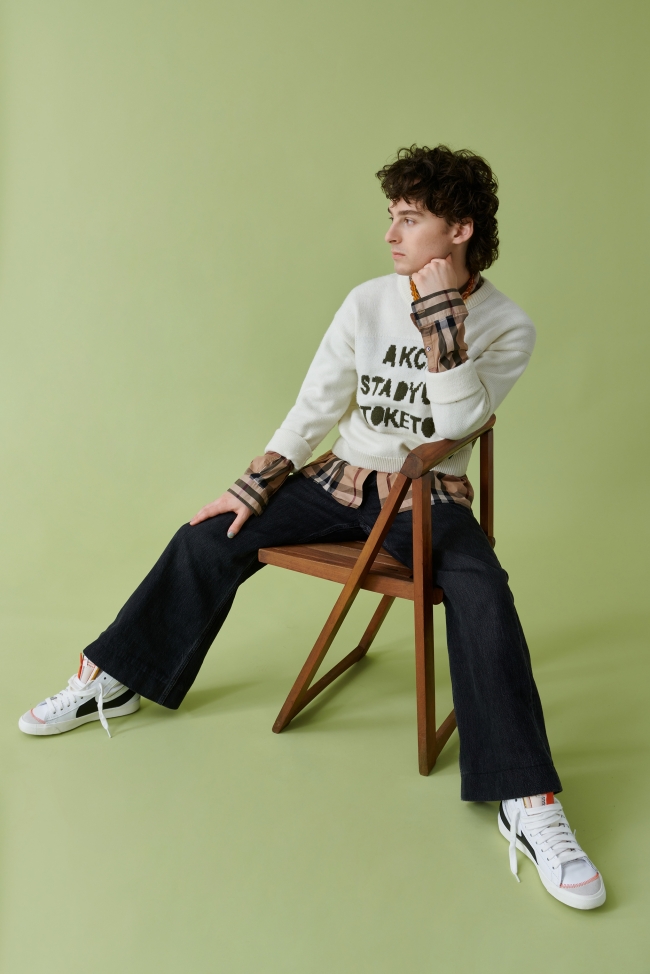
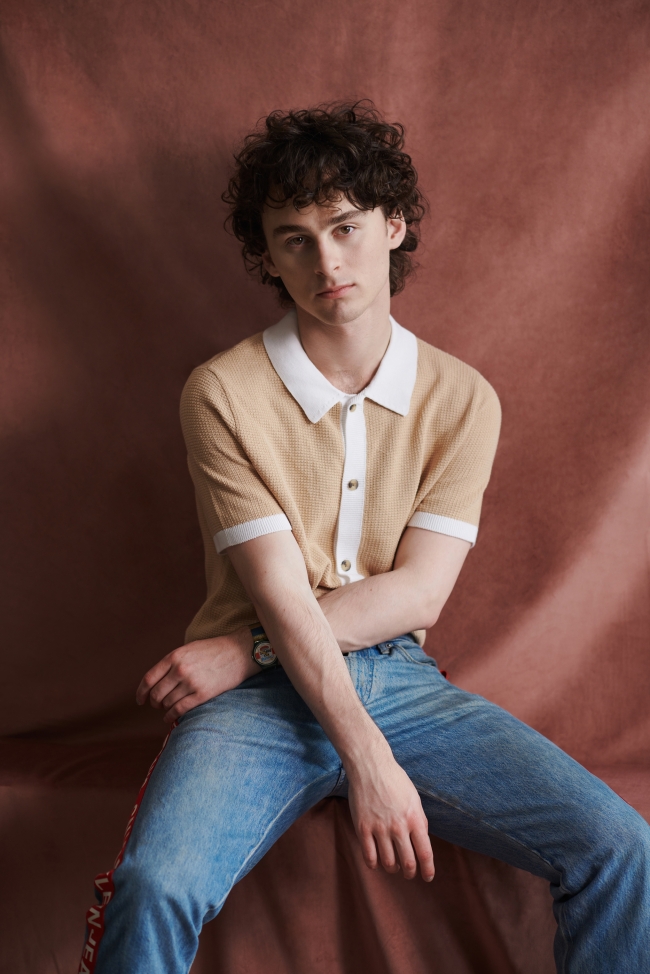
above left: Wyatt wears Shirt by Burberry, Jumper and Jeans by Acne Studios, Trainers by Nike and Necklace by Saule
above right: outfit as before
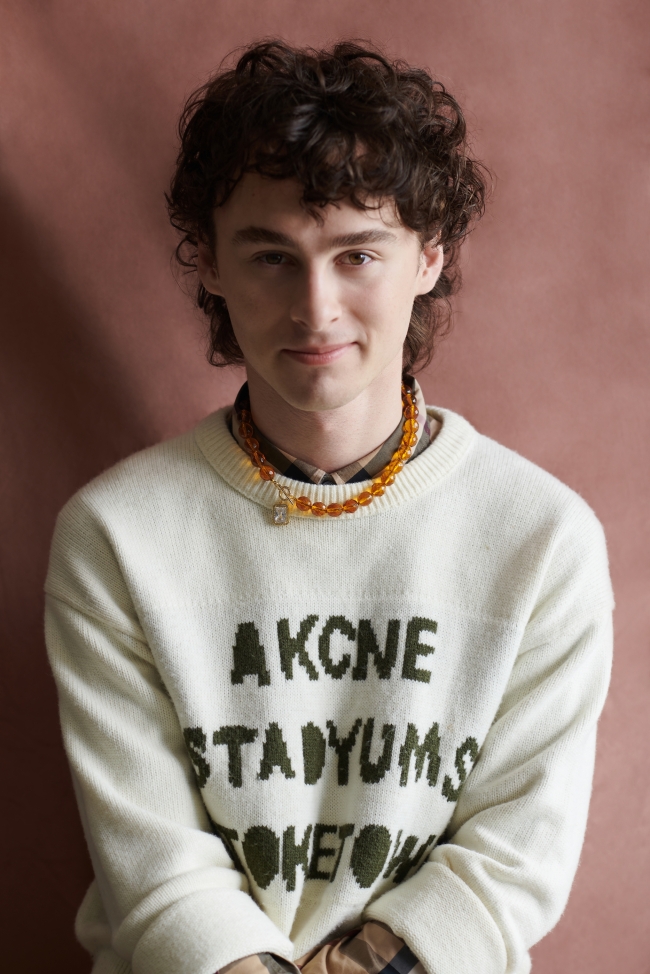
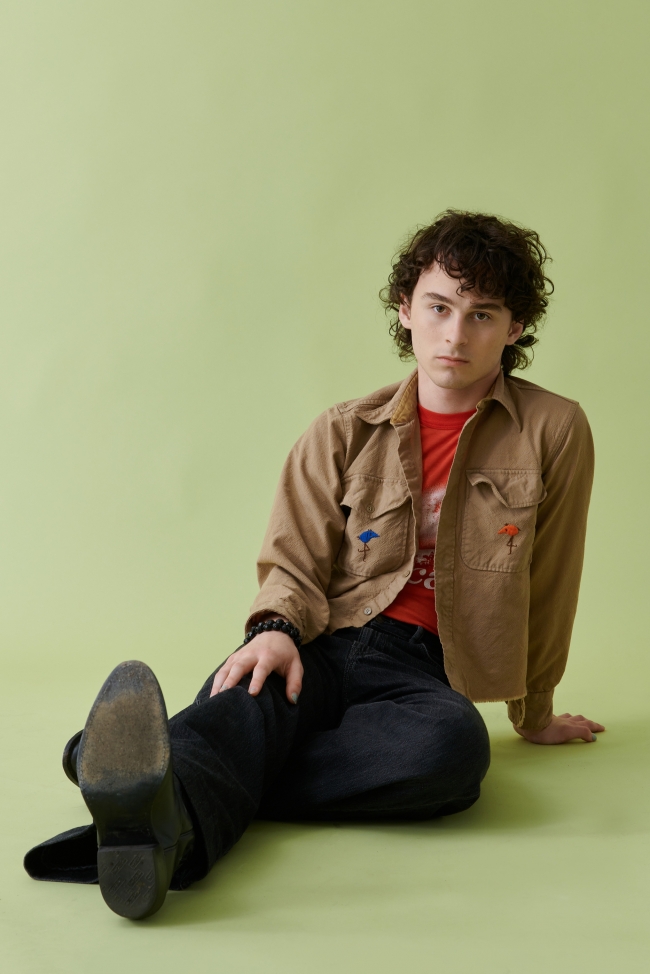
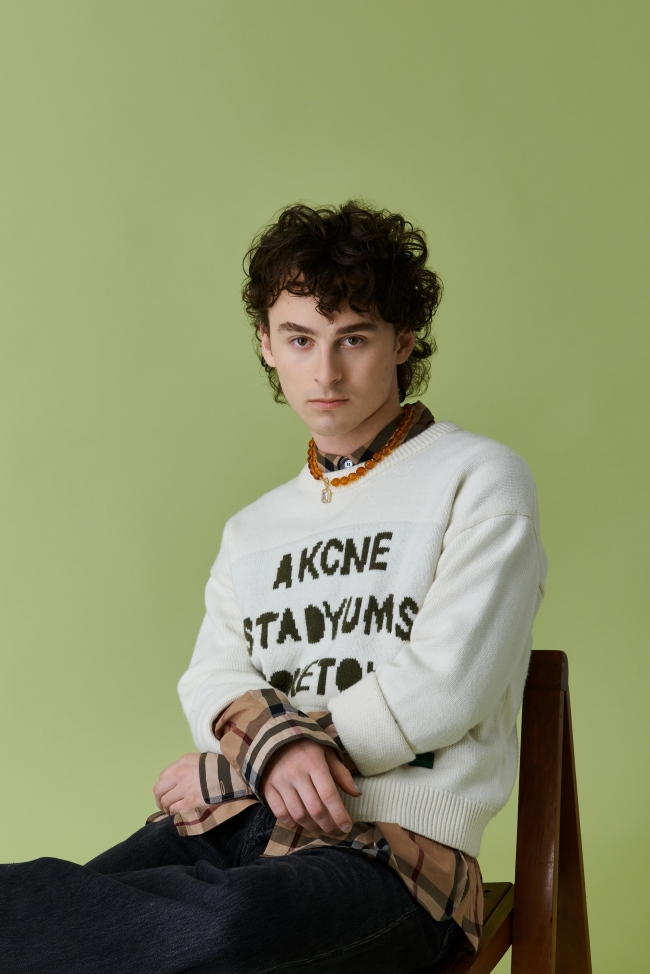
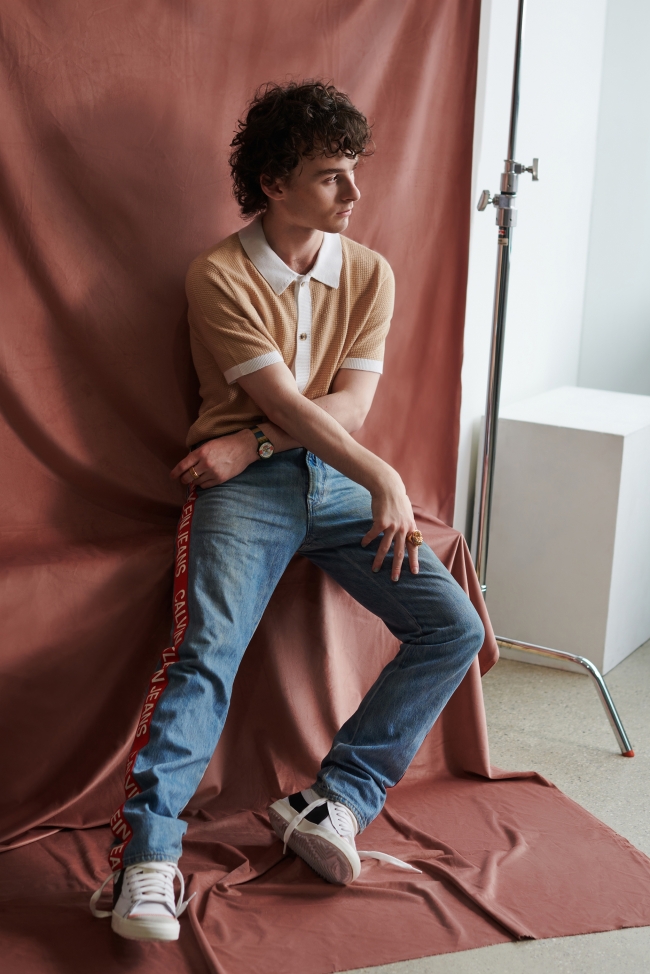
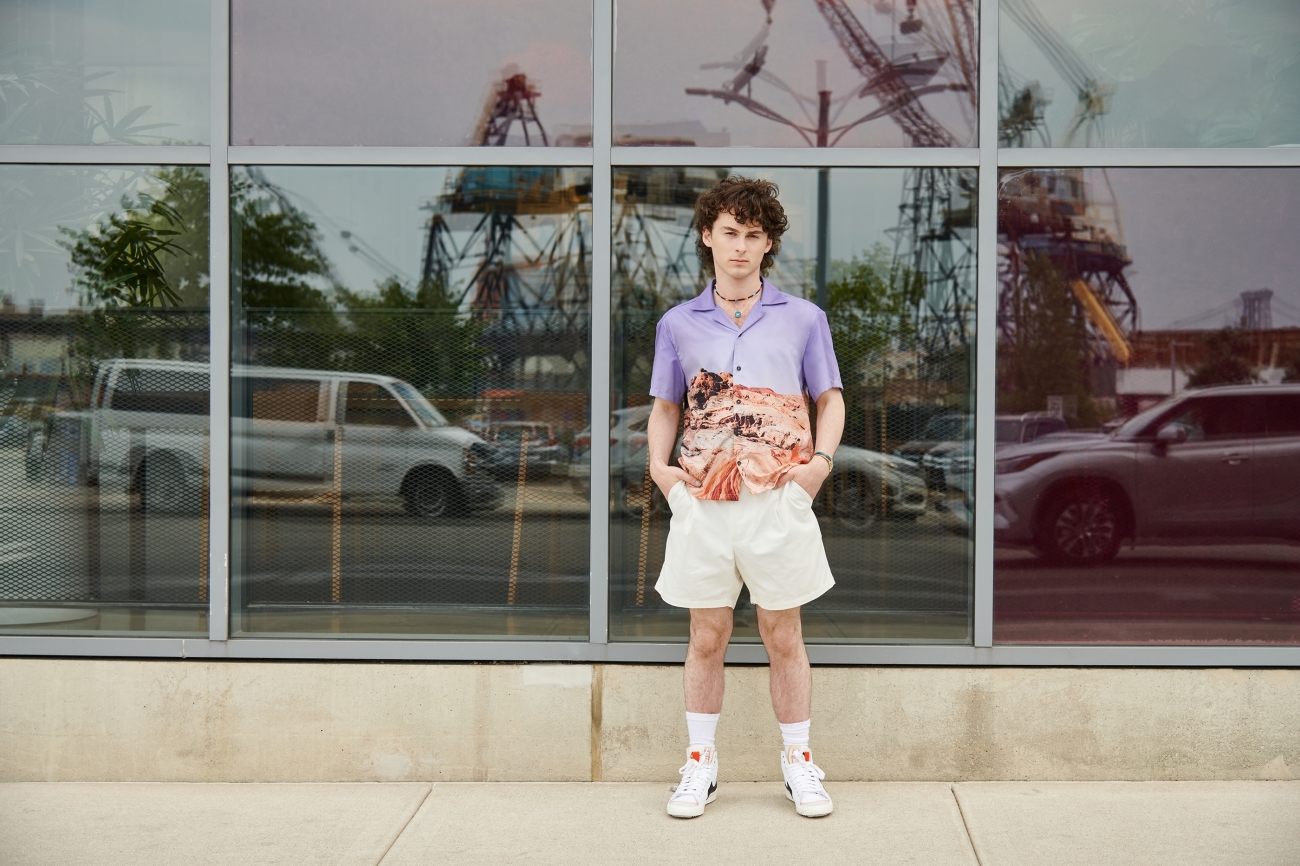
above: Wyatt wears Shirt by CAT, Shorts by Okane, Trainers by Nike, Watch by La Californienne, Necklaces by Elsie Frieda
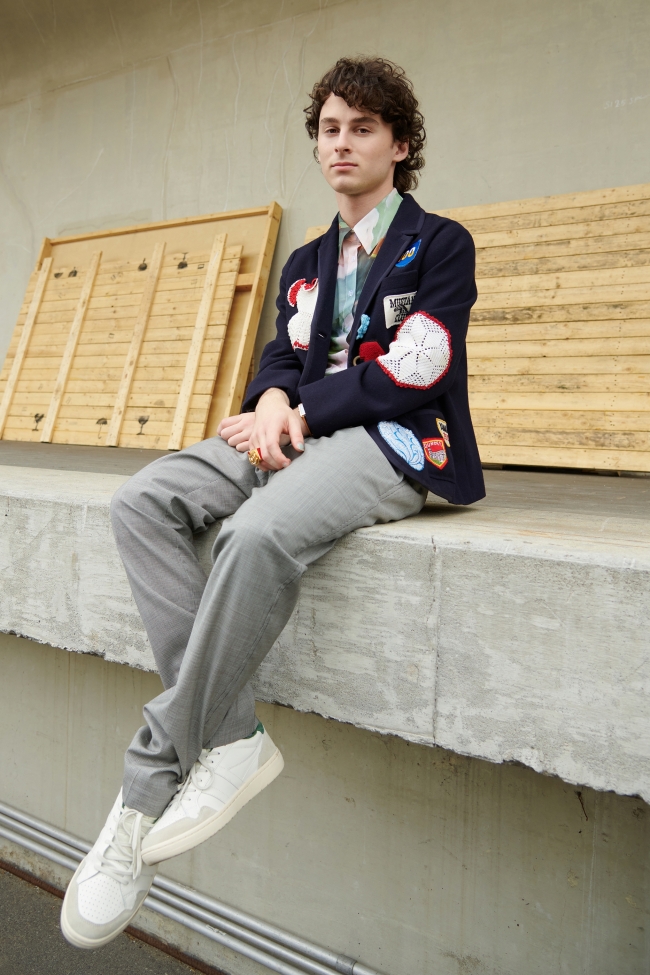
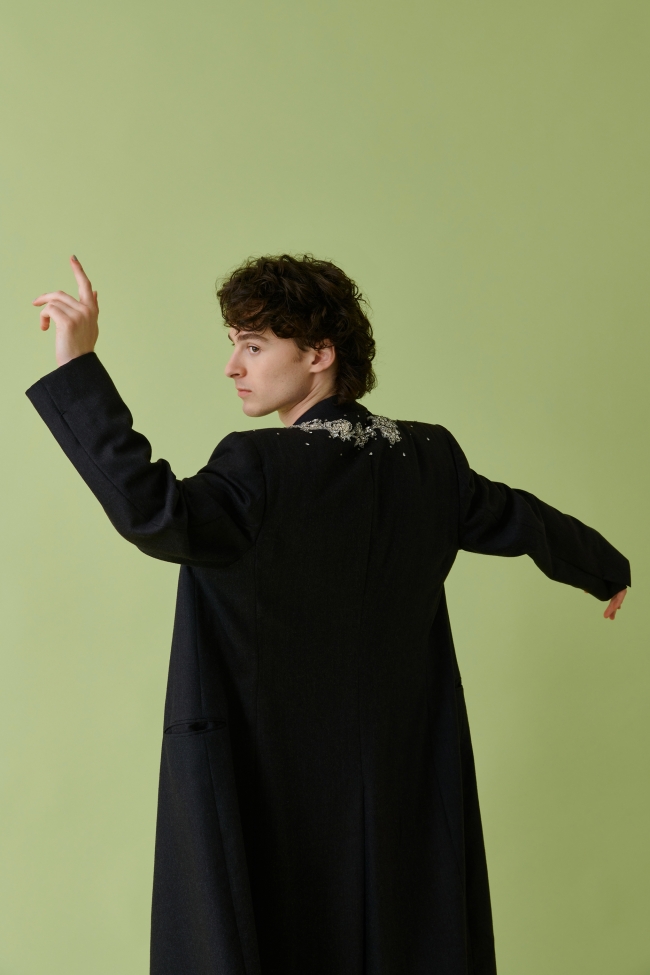
above left: Wyatt wears Blazer by The Series, Shirt by Caroline Zimbalist, Trousers by Stella McCartney, Trainers by Gola, Watch by La Californienne and Rings by Acchitto
above right: outfit as before
